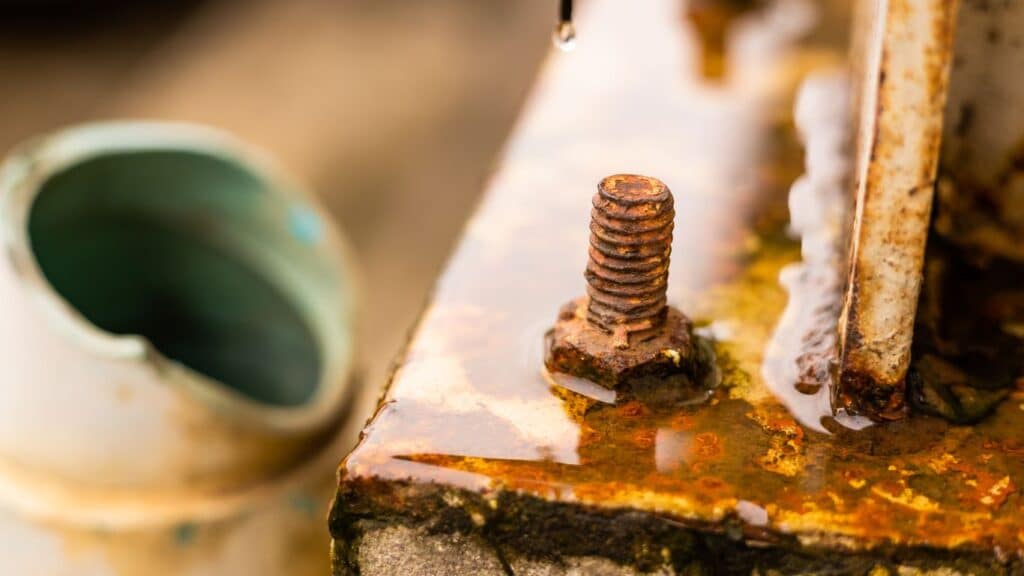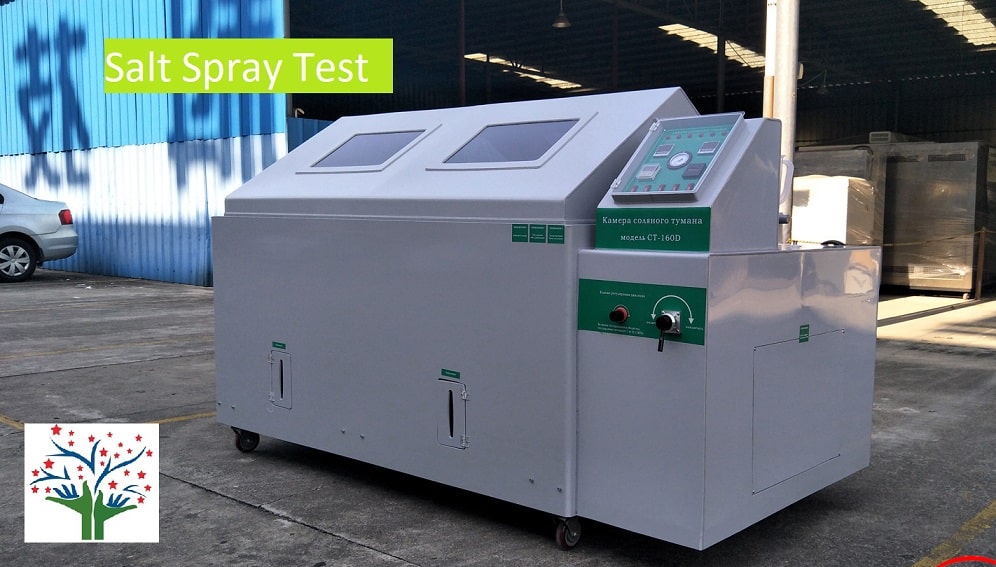Salt Spray Test for Corrosion
The salt spray test, also known as the salt fog test or salt mist test, is a standardized procedure used to assess the corrosion resistance of various materials, especially metals and their coatings.
In a world where metal components are widely used across industries, it becomes crucial to ensure their durability and resistance to corrosion. One of the most effective methods for evaluating corrosion resistance is the salt spray test. This article explores the salt spray test, its purpose, procedure, and significance in determining the ability of materials to withstand corrosive environments.
What is Corrosion?

Corrosion, the gradual deterioration of metals and alloys, is a natural process caused by chemical reactions between a material and its environment. Factors such as humidity, temperature, and the presence of corrosive agents like salt can accelerate this process significantly. Corrosion not only compromises the structural integrity of materials but also poses serious safety concerns. Hence, it becomes imperative to assess the corrosion resistance of materials prior to their deployment.
What is Salt Spray Test?
The salt spray test, also known as the salt fog test or salt mist test, is a standardized procedure used to assess the corrosion resistance of various materials, especially metals and their coatings. This test exposes the specimen to a highly corrosive environment resembling a salt-laden coastal atmosphere. By subjecting materials to a controlled saline mist, the salt spray test simulates the harsh conditions that can accelerate corrosion in real-world scenarios.

“https://www.wewontech.com/ct-160d-salt-spray-chamber”
Purpose of the Salt Spray Test
The primary objective of the salt spray test is to evaluate the resistance of materials to corrosion caused by salt deposition, which is a common concern in marine and coastal environments. By subjecting the test specimen to a continuous, accelerated corrosion process, it is possible to assess the performance and durability of protective coatings, surface treatments, and material combinations.
Salt Spray Test Procedure
Here’s a general outline of the procedure:
Preparation
The material or component to be tested is thoroughly cleaned to remove any contaminants that could interfere with the results. This step ensures that the sole variable being tested is the material’s resistance to corrosion.
Test Chamber
The cleaned sample is placed in a salt spray test chamber, which is a controlled environment specifically designed for this purpose. The chamber is sealed to prevent any external contaminants from affecting the test.
Salt Solution
A salt solution, typically a 5% sodium chloride (NaCl) solution, is prepared and atomized into a fine mist within the chamber. The mist consists of tiny salt particles suspended in the air, replicating the corrosive nature of salt-laden atmospheres.
Test Duration
The sample remains in the salt spray chamber for a predetermined period, which can vary depending on the testing standards being followed. Common durations range from 24 hours to several weeks, with intermittent periods of drying to simulate the cyclic nature of real-world corrosion processes.
Observation and Evaluation
After the test duration has elapsed, the sample is removed from the chamber, cleaned, and examined for signs of corrosion. The extent and nature of corrosion, such as pitting, rust, or color changes, are documented and compared against predefined criteria or industry standards.
What is Salt Spray test?
— Perfect Pollucon Services – Air Quality Monitoring (@PerfectPollucon) June 13, 2023
The salt spray test, also known as the salt fog test or salt mist test, is a standardized procedure used to assess the corrosion resistance of various materials, especially metals and their coatings. #saltspraytest #corrosiontesting pic.twitter.com/UKCv6B2dDp
Significance of the Salt Spray Test
The test holds significant importance for several reasons:
Quality control: Manufacturers rely on the salt spray test to assess the quality and effectiveness of protective coatings, surface treatments, and corrosion-resistant materials. It helps them ensure that their products meet industry standards and customer expectations.
Material selection: The test aids engineers, architects, and designers in selecting the appropriate materials for applications in corrosive environments. By comparing the performance of different materials and coatings, they can make informed decisions and choose the most suitable option for their specific requirements.
Research and development: The salt spray test serves as a valuable tool for researchers and scientists to study corrosion mechanisms, develop new materials, and enhance existing protective coatings. It provides a controlled and accelerated environment for testing the effectiveness of innovative solutions.
Read more about Corrosion Testing Labs
Salt Spray Test Standard
The salt spray test is conducted according to various international standards, which provide guidelines and procedures for performing the test. These standards ensure consistency and comparability of results across different laboratories and industries. Some of the commonly followed salt spray test standards include:
ASTM B117
This is the most widely recognized standard for salt spray testing. It is published by the American Society for Testing and Materials (ASTM) and provides guidelines for conducting neutral salt spray (NSS) and acidified salt spray (ASS) tests. ASTM B117 outlines the test chamber requirements, specimen preparation, test duration, evaluation criteria, and reporting of results.
ISO 9227
The International Organization for Standardization (ISO) developed this standard for salt spray corrosion tests. ISO 9227 provides detailed instructions for conducting both NSS and ASS tests. It specifies the test conditions, including temperature, humidity, and salt concentration, as well as the sample preparation, test duration, and evaluation methods.
JIS Z 2371
This standard is issued by the Japanese Industrial Standards (JIS) and is widely used in Japan and other Asian countries. JIS Z 2371 specifies the salt spray test method, including the test chamber requirements, test conditions, specimen preparation, test duration, and evaluation criteria.
DIN EN ISO 9227
This is the European equivalent of the ISO 9227 standard. It provides guidelines for conducting salt spray tests in European countries. DIN EN ISO 9227 outlines the test parameters, specimen preparation, test chamber specifications, test duration, and evaluation methods.
MIL-STD-810
This standard is followed by the United States Department of Defense (DoD) for testing the environmental durability of military equipment. It includes a section (Method 509.6) specifically dedicated to salt spray testing. MIL-STD-810 outlines the test requirements, specimen preparation, test duration, evaluation criteria, and reporting of results.
It’s important to note that these standards may have specific requirements and variations in terms of test duration, test conditions, and evaluation criteria. Therefore, it is crucial to refer to the specific standard relevant to your industry and region to ensure accurate and consistent test results.
Furthermore, it’s worth mentioning that some industries or companies may have their own internal specifications or standards for salt spray testing, which may be based on or derived from the aforementioned international standards. These internal standards should be followed when conducting salt spray tests within specific organizations or industries.
Read More about Corrosion Control At Data Centres.
Why Salt Spray Test is required?
The salt spray test is required to evaluate the corrosion resistance of materials and coatings in a controlled and accelerated manner. By subjecting specimens to a saline mist environment, it simulates the corrosive effects of saltwater or coastal atmospheres.
This test is crucial for industries dealing with products or components exposed to corrosive environments, such as automotive, aerospace, marine, and electronics. It helps assess the performance, durability, and suitability of materials and coatings, enabling manufacturers to select the right materials, ensure quality assurance, and comply with industry standards.
Additionally, the salt spray test aids in research and development efforts to advance corrosion-resistant solutions and optimize their performance before practical application. Ultimately, the test plays a vital role in preventing premature failure due to corrosion and ensuring the longevity and reliability of products and components in challenging environments.
Perfect Pollucon Services offers Corrosion Testing Services to assess the susceptibility of materials and components to corrosion, helping industries ensure the durability, safety, and reliability of their products in diverse environments.
Limitations and Considerations
While the salt spray test is a widely accepted method for corrosion resistance evaluation, it does have limitations. It should be noted that the test conditions may not precisely replicate real-world conditions, and the results may not directly correlate with the long-term performance of materials in actual environments. Additionally, the test may not consider other factors such as temperature variations, UV exposure, or mechanical stresses that can influence corrosion. Therefore, it is crucial to use the salt spray test as one of several tools in a comprehensive evaluation process.
Conclusion
The salt spray test serves as a valuable tool in assessing the corrosion resistance of materials. By subjecting materials to a simulated salt-laden environment, this test provides insights into their performance and durability. Manufacturers, researchers, and quality control professionals can rely on the salt spray test to make informed decisions about material selection, coatings, and design improvements. However, it is crucial to remember that the test’s results should be interpreted alongside other tests and real-world observations to ensure a holistic understanding of a material’s corrosion behavior.
Resources Used:
- American Society for Testing and Materials (ASTM): Visit their website (www.astm.org) to access ASTM B117, which provides the standard test method for salt spray testing.
- International Organization for Standardization (ISO): The ISO website (www.iso.org) offers ISO 9227, the international standard for salt spray testing.
- Japanese Industrial Standards (JIS): For information on JIS Z 2371, the Japanese standard for salt spray testing, refer to the JIS website (www.jisc.go.jp).
Salt spray test is used to measure corrosion resistance of metal, material or coatings.
Salt Spray test is type of corrosion testing. It checks the metals or coatings resistance to mist of saltwater for specific duration.
pH of Salt spray test should be from 6.5 to 7
